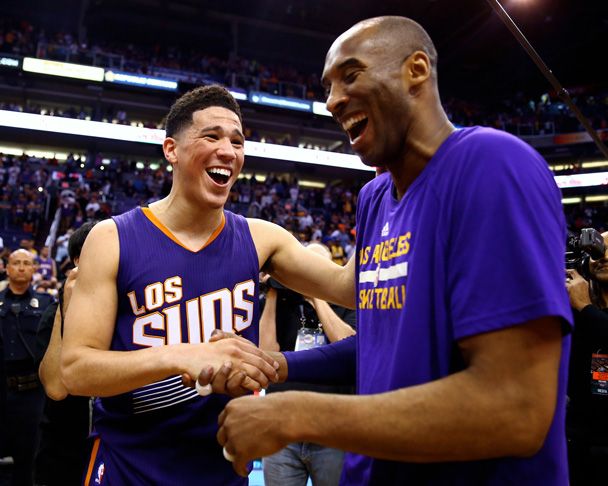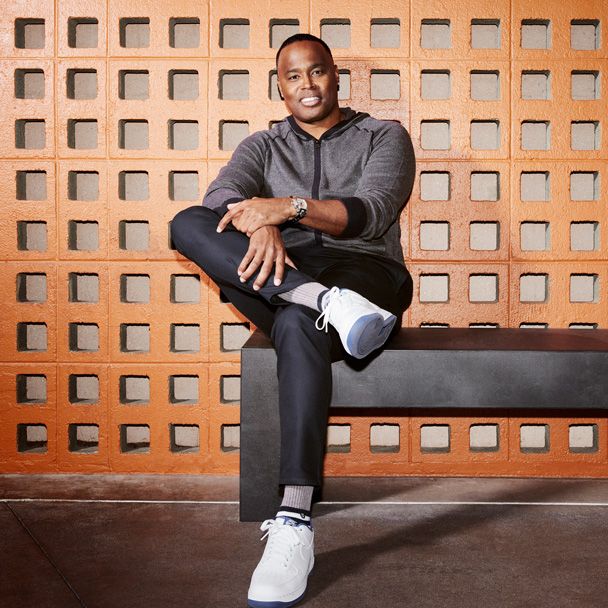The rise of Devin Booker
DBook #DBook

AND YET, HERE he is at the start of his sixth NBA season, after averaging 25, 27 and 27 points the past three, after drawing comparisons from some in his fraternity to a young Kobe, finding it necessary nonetheless to fire off a tweet to tell people his name. “It’s Book or DBook,” he wrote in December, not Devin.
And here we are realizing how little we’ve known about Book, which is what happens when you’ve never been to the playoffs, when you’re rarely involved in prime-time nationally showcased games, when your franchise has been irrelevant for 10 years.
Thirty-one points a game on 50% shooting in the bubble and it turns out that in a league of one-name stars, many of them not as prodigious, as efficient, as consistent, as charismatic, or with as fascinating a backstory as Booker, we are just now finding out his name. Book. You could, if you weren’t paying attention to the Phoenix Suns the past five years and didn’t know he already has a 70-point game on his résumé, make the case that the bubble was the venue of Book’s coming-out party. Just don’t make the case to him.
There was already a party, as he sees it, it’s just that in the bubble “more people got invited.” Tweets aside, Book knows “the extra things are going to come with team success, the playoff experiences. … They’re on the way, and I’m going to work and get there no matter what.”
It doesn’t seem like an empty promise either, what with the Suns right in the middle of the NBA Western Conference chase 20-some games into the season, having acquired future Hall of Fame playmaker Chris Paul, a real-life Exhibit A of a player who makes his teammates better. While the CP3-Book tag team is undoubtedly at the center of the Suns’ story, they’re putting together a nicely diverse ensemble, including Deandre Ayton, the hugely talented but late-blooming young center, and equally inexperienced but also talented small forward Mikal Bridges.
But the most necessary piece for any team with serious expectations to contend is the superstar — or a player moving in that direction. For the Suns, that’s Book, and he seems totally unafraid of the process it takes to turn potential into greatness. “My job is to lead this group, listen to this group, lead by example,” he says. To do that, he will have to impact the game not only by scoring but also defensively — and in at least a half-dozen intangible ways. He’ll have to, on many nights, scare the opposition and keep his teammates on edge. He’ll have to handle the pressure and deliver on the promise Kobe and others have seen in him — and do it when the stakes matter most. It’s all a prerequisite of becoming legendary.
BOOK GREW UP with his mom, Veronica Gutierrez, in Grand Rapids, Michigan, as one of three siblings, including his younger sister, Mya, who has a chromosomal abnormality called 22q deletion syndrome that causes a developmental disability. His dad, Melvin, played two seasons in the NBA during the ’90s and spent 11 years playing in Europe and Asia, compiling a lifetime’s worth of knowledge and experience that, while he didn’t know it at the time, would be the A-to-Z of what he would teach his son about basketball life.

Booker was just a rookie when he matched up against Kobe Bryant in the Lakers legend’s final appearance in Phoenix. His childhood idol took him aside after the game and gave him advice on how to become an NBA great. Mark J. Rebilas/Imagn
Melvin credits Veronica with keeping father and son connected when he was abroad. “You know how hard it is to call a 9-, 10-year-old and try to talk on the phone? She did a great job to keep the bond,” he says. “Every opportunity that I was able to come to the States, if I had a break overseas or in the offseason, she allowed Devin to come to Mississippi with me.”
Culturally, Mississippi was the other side of the world from Michigan. “On Devin’s first visit to Mississippi, he called cornbread ‘cake,'” Melvin says. “‘Dad, can I have another piece of that cake?'”
During his visits, Devin would spend time with his dad and his dad’s friends, playing ball and listening to their stories. Devin’s friends and family often describe him as an “old soul,” which his dad thinks “he picked up always being the youngest guy in the room, just soaking it all in.”
When Melvin retired and returned to the U.S. in 2008, he asked Devin to come live with him in Moss Point, Mississippi.
“I spent the first year [after retirement] just recruiting him,” Melvin says. “I’d fly to Michigan and watch him play, and try to convince him and his mom.”
Melvin had two agendas, one athletic and one cultural: “I wanted to put him in an environment where he played in predominantly Black gyms, that [show him] the speed of the game was different. Socially, he had to walk the hallways … where some of these kids didn’t have fathers in their lives, and some kids were living a rough life that Devin never experienced. It opened his eyes to a lot of things.”
Book tells the story with great fondness now, how it felt to navigate, after his freshman year in high school, the move from a largely white Midwestern community to the Deep South of his dad’s upbringing. He is a child of interracial parentage — Mexican American mom, African American dad — whose ability to adapt was put to the test immediately.
“[Kobe] told me I have the footwork‚ I have the intangibles to be legendary.”
– Devin Booker
“It was a tough transition,” he says. “My pops, he brought me down to the ‘hood, man. I learned a lot. Being that young and having to understand different cultures and understand these kids were raised differently than I was used to … I had to earn people’s respect. It wasn’t going to come easy, coming from an out-of-towner right to the court. People were going to come after me, and I was fine with that. But it was an adjustment period for me.”
If the move from Michigan to Mississippi reinforced the need to appreciate and maximize the grind, the boring but necessary elements of chasing success, then the father has a well-deserved “told you so” coming when the son starts to find the bigger rewards. Melvin and Paul appear to be the bookends who make sure Book doesn’t forget the grind.
“I fell in love with the grind,” he says. “I fell in love with the process. I fell in love with being in those gyms. Me and my dad always joke about it, but he said I need to bring that dog out. Being in those gyms down in Moss Point brought the extra dog out of me. Having my father around, his stern voice, shaped and molded me into what I became and what I’m becoming.”
WHEN BOOK WENT to the University of Kentucky in 2014, Melvin, presuming he’d have plenty of time to attend his son’s games in Year 2 or even Year 3, didn’t plan to attend many. The teenager slotted into John Calipari’s two-platoon system with a bunch of other future NBAers (Karl-Anthony Towns, Willie Cauley-Stein, Trey Lyles, Alex Poythress, the Harrison twins and Tyler Ulis among them). He relished being in the gym with all of those budding stars. And he relished the fight.
“Before Kentucky, having conversations with my family, I just wanted to be a part of that. I know how hard I work, and I want to go match up with the best talent in the world,” he says. “Once I was there, I was comfortable. I’m not saying it was easy every day, but I didn’t feel like I didn’t belong.”

After his freshman year of high school, Booker moved from Michigan to Mississippi to live and train with his dad, Melvin, who played in the NBA and abroad. Jesse Rieser for ESPN
Book averaged 10 points and 21.5 minutes per game as a Wildcat and was the SEC’s Sixth Man of the Year in 2014-15. He didn’t start a single game, but he had so many scoring explosions in limited playing time that scouts had seen enough. The Suns drafted him 13th overall in the first round.
At just 18, he left the well-oiled machine in Lexington for one of the worst franchises in the NBA. In Book’s first four seasons in Phoenix, the Suns were at the bottom of every list: fewest wins, 29th-ranked offense, 30th-ranked defense. They went through four coaches. But like he learned with his dad in Mississippi, Book kept grinding. He had that 70-point game, those back-to-back 50-point games. He kept working.
“He understands the science of scoring,” says Eddie Johnson, who has broadcast Suns games for even longer than the 17 seasons he played in the NBA. “A lot of young guys don’t know the science of scoring; they just want to jack up a bunch of 3s. LeBron gets 20 in his sleep. James Harden, Dame Lillard, CJ McCollum — these guys understand the science of scoring. I guarantee you Kobe had that conversation with Book.”
So when the invitation came to travel to the bubble last summer, Book knew it was time to invite more people to the party.